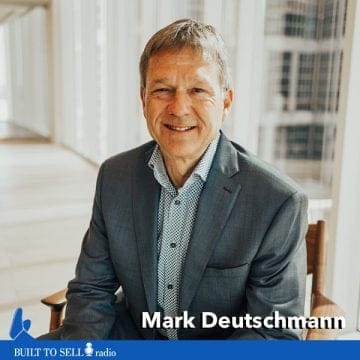About this episode
Mark Deutschmann started Village Real Estate in 1996 and by 2018 he had grown it to 350 salespeople. Then six of his agents decided to compete with him. Anyone would be upset, but you’ll be surprised at what Deutschmann did next.
To read a transcript of this episode, click here.
Mark Deutschmann started Village Real Estate in 1996 and grew his residential real estate brokerage to 350 agents and $30 million in revenue – then, he heard some disturbing news. One of his agents and five former colleagues had been secretly planning to launch their own agency to compete with Deutschmann.
Rather than steeling for a fight, Deutschmann suggested the six agents simply buy Village Real Estate instead. So they did – and only for a few weeks later for $9.75 million.
In this episode, you’ll learn:
- How to value a sales agency
- How to get an extra 21% for your company (Deutschmann’s original offer was only $8 million, but he received $9.75 million)
- The perfect time to sell your company (hint: it’s when someone is ready to buy it)
- The surprising benefit to your marriage of cashing out
At the time he received his acquisition offer, Deutschmann had reduced his personal involvement in Village Real Estate down to just a third of his time giving him the band width to focus on other projects. How dependent is your company on you showing up for work? You can measure this right now by completing “The Hub & Spoke” exercise in Module 7 of The Value Builder System™. Get started by completing the Value Builder questionnaire.
Check out our article on 4 Things Led To A Doubling Of This Company’s Value.

About Our Guest
Mark Deutschmann is founder and chair emeritus of Village Real Estate Services, a company he started in 1996 and sold in January 2019. In 2003, he started Core Development Services, a company actively developing Nashville’s urban center with adaptive reuse and mixed-use infill development. The nonprofit Village Fund Deutschmann started has provided $2.2 million in grants to social profits helping to enrich and strengthen Nashville.


